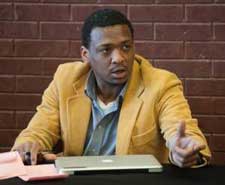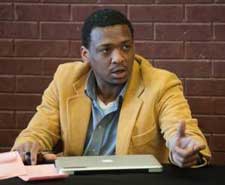 KINGSTON, R.I., June 9, 2015 – David Ragland was visiting his parents in St. Louis last summer when a friend called with awful news: An unarmed teen had been gunned down by a police officer in Ferguson, a small suburb in the Midwestern city.
KINGSTON, R.I., June 9, 2015 – David Ragland was visiting his parents in St. Louis last summer when a friend called with awful news: An unarmed teen had been gunned down by a police officer in Ferguson, a small suburb in the Midwestern city.
Sadly, Ragland was not surprised. For years, he’s been studying police violence against black Americans, and he says Michael Brown’s killing was another example of racism rearing its ugly head.
The 39-year-old professor at Bucknell University remained in Ferguson for the next two weeks, participating in protests that led to gun-wielding police officers riding atop armored vehicles.
“It was surreal and scary,” he says. “I didn’t feel like I was in the United States.”
Ragland will tell his story Wednesday, June 10, during a talk as part of the annual International Nonviolence Summer Institute at the University of Rhode Island. Activist and Emory University professor Bernard Lafayette Jr., will join him at 7 p.m. in the Multicultural Center, 74 Lower College Road, on the Kingston campus. The talk is free and open to the public.
Ragland is among 51 people from around the country and world attending the two-week institute, launched 14 years ago by the URI Center for Nonviolence and Peace Studies. Participants learn how to resolve conflicts peacefully and work for social change.
Besides Ragland, other participants include the first female mayor of Afghanistan who is now living in Westerly; a Nigerian man who negotiates peace among warring factions in his country; human rights activists from Liberia and Uganda; and an American woman whose mother was murdered by the KKK after participating in the 1965 Voting Rights March from Selma to Montgomery. Countries represented include India, Nigeria, Palestine, Germany, China, Tibet and Turkey.
“The way our participants from different cultures and diverse backgrounds have come together in such a short time to learn the skills of nonviolence has been astonishing,” says Paul Bueno de Mesquita, center director and a URI psychology professor. “Their teamwork offers a hopeful example that a global beloved community is truly possible.”
The sessions, which end June 12, are informal and lively, focusing on the nonviolent methods of Dr. Martin Luther King, Jr. Participants also get a chance to share their personal experiences with conflicts in this country and overseas.
“We’re learning what peace looks like in different countries,” says Ragland. “Nonviolence can provide a framework for how to go forward in the future.”
Ragland was raised in a black working-class neighborhood in St. Louis. His father was a pipefitter; his mother was a real estate agent. Both instilled the value of education. Ragland attended a private high school and got his bachelor’s in finance from a small liberal arts college in Ohio.
He found a job on Wall Street, but left after two years for a new calling: social justice and education. He earned his doctorate in peace education from the University of Toledo and landed a job teaching education for peace and justice at Bucknell University.
He was at his parents’ house, just a few miles from Ferguson, when a friend called about Michael Brown. “I wasn’t too surprised,” he says. “You hear about black men getting killed on a regular basis.”
He drove to the scene and started interviewing protesters, who were angry and fed up. “They’re killing us,” one man told him. Ragland ended up staying for two weeks, joining in the protests and going to community meetings, where local activists tried to come up with solutions.
He persuaded Bucknell to let him teach an online class from Ferguson, using Google Hangout. At one point, he taught from the infamous McDonald’s in Ferguson where police arrested several journalists during the early days of the protest. Several of his students also came to visit as part of the class.
His experience inspired him to team up with colleagues to create the Truth-Telling Project, which is examining longtime institutional racism that goes beyond the police and government officials in Ferguson. Ragland also looks at the root causes of unrest – poverty and economic inequality.
Michael Brown’s killing by officer Darren Wilson was unnecessary, says Ragland. “Darren Wilson said Michael Brown looked like a demon coming at him,” he says. “Black men in America are regarded as these non-human entities.”
He says it’s shameful that police left Brown’s body on the street for hours. It was in Ferguson where he met Lafayette, who suggested he attend the URI nonviolence institute. Now, nearly a year later, the two are sharing their stories.
“I feel called to work for change that makes all of us feel like we’re part of America,” says Ragland. “In Ferguson, people don’t feel like they’re part of society. No one listens. Things have to be different.”
Pictured above: David Ragland, of Lewisburg, Pa., and St. Louis, Mo., an education professor at Bucknell University who is attending the 2015 International Nonviolence Summer Institute hosted by the Center for Nonviolence and Peace Studies at the University of Rhode Island. Photo courtesy of David Ragland.

